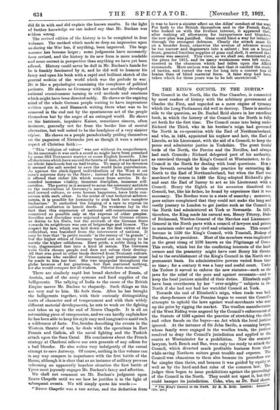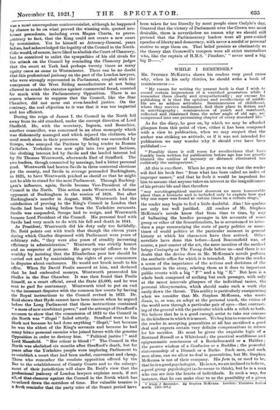THE KING'S COUNCIL M I li.e.. NORTH.* Tan Council in
the North, like the Star Chamber, is connected by most readers of history with the arbitrary government of Charles the First, and regarded 'as a mere engine of tyranny which the Long Parliament did well to destroy. There is another side to the question, as. Dr. Rachel Reid shows in her excellent book, in which the history of the Council in the North is fully set forth, for the first time. The Council came into being under Richard the Third, who in his brother's reign had governed the North in co-operation .with the Earl of Northumberland, and who, in 1484, appointed his nephew and heir, the Earl of Lincoln, as his Lieutenant, with the aid of a Council, to keep the peace and administer justice in Yorkshire. The great feudal lords of the North, the Percies and the Nevilles, had always had such Councils ; Richard delegated part of his authority, as exercised through the King's Council at Westminster, to the Council in the North for dealing with local questions. Henry the Seventh reverted to the older practice by entrusting the North to the Earl of Northumberland, but when the Earl was murdered by rioters in 1489 the King adopted Richard's plan and sent the Earl of Surrey to act as his Lieutenant with a Council. Henry the Eighth at his accession dissolved the Council, but,, like his father, he found by experience that it was necessary. The Borders were in a state of anarchy ; moreover, poor suitors complained that they could not make the long and costly journey to London to get justice such as the Commit in the North had administered at York or Newcastle. In 1525, therefore, the King made his natural son, Henry Fitzroy, Duke of Richmond, Warden-General of the Marches and Lieutenant. General in the North parts with a council of lawyers and priests to maintain order and try civil and criminal oases. This council became in 1530 the King's Council, with Tunstall, Bishop of Durham, as its president. Most of the members were implicated pi the great rising of 1538 known as the Pilgrimage of Grace. This revolt, which but for the conflicting interests of the land- owners and the peasantry might have coat Henry his throne, led to the establishment of the King's Council in the. North on a permanent basis. Its administrative powers varied from time to time ; for a century it was a busy and useful court. Under the Tudors it served to enforce the new statutes—such as the laws for the relief of the poor and against recusants—and to keep the local justices mindful of their duties. Elizabeth might have been overthrown by her " over-mighty " subjects in the North if she had not had her watchful Council at York.
Towards the end of Elizabeth's reign, when trade was bad, the sheep-farmers of the Pennine began to resent the Council's attempts to uphold the laws against wool-merchants who sent up the price by rigging the market. The woollen manufacturers of the West Riding were angered by the Council's enforcement of the Statute of 1593 against the practice of stretching the cloth and other frauds on the buyer—an Act which the local justices ignored. At the instance of Sir John Savile, a cunning lawyer, whose family were engaged in the woollen trade, the justices resolved to deny the Council's jurisdiotion and applied to the courts at Westminster for a prohibition. Now the common lawyers, both Bench and Bar, were only too ready to attack the Council, which diverted much profitable business from then while saving Northern suitors great trouble and expense. The Council was obnoxious to them also because its procedure was far simpler than theirs, and because it was guided by equity se well as by the hard-and-fast rules of the common law. The judges then began to issue prohibitions against the proceedings of the Council in the North. They could not upset it, but they could -hamper its jurisdiction. Coke, who, as Dr. Reid shoo • Ths Hines Council is.the North. 13y L B. Bell. 'aeon; Wig= 128s. net.] Wad a most unscrupulous controversialist, although ho happened by chance to be on what proved the winning side, quoted irre- levant precedents, including even Magna Charts, to prove, contrary to fact, that the King could not create a new court by commission. Yet he himself as Attorney-General, years before, bad acknowledged the legality of the Council in the North. Coke would, of course, have liked to abolish the Court of Chancery, but he contrived to enlist the sympathies of his old rivals for the attack on the Council by reminding the Chancery judges that the court at York had perhaps twenty times as many equity cases as came to Westminster. There can be no doubt that this professional jealousy on the part of the London lawyers, who were strongly represented in Parliament, coupled with the annoyance of the West Riding manufacturers at not being allowed to evade the statutes against commercial fraud, counted for much with the Parliamentary Opposition. There is no reason whatever to suppose that the Council, like the Star Chamber, did not mete out even-handed justice. On the contrary, the real objection to it was that it was too impartial and too efficient.
During the reign of James I. the Council in the North fell away from its old standard, under the corrupt direction of Lord Sheffield. He, with the secretary, Ingram, and Bourchier, another councillor, was concerned in an alum monopoly which was dishonestly managed and which injured the clothiers, who used much alum in their processes. Sheffield was succeeded by Scrope, who annoyed the Puritans by being tender to Roman Catholics. Yorkshire was now split into two great factions, the clothing interest led by Savile and the landed interest led by Sir Thomas Wentworth, afterwards Earl of Strafford. The two leaders, though connected by marriage, had a bitter personal feud. Wentworth had beaten Savile in three contested elections for the county, and Savile in revenge persuaded Buckingham, in 1625, to have Wentworth pricked as sheriff so that he might not be able to stand for the next Parliament. Through Bucking. ham's influence, again, Savile became Vice-President of the Council in the North. This action made Wentworth a furious opponent of Buckingham in the session of 1628. But after Buckingham's murder in August, 1628, Wentworth had the satisfaction of proving to the King's Council in London that Savile had been taking bribes from the Yorkshire recusants. Savile was suspended, Scrope had to resign, and Wentworth became Lord President of the Council. His personal feud with Savile had very much to do with his fall and death in 1641.
As President, Wentworth did his duty only too faithfully. Dr. Reid points out with truth that though the eleven years during which Charles dispensed with Parliament were years of arbitrary rule, " they were also years of steadily increasing efficiency in administration." Wentworth was strictly honest and no respecter of persons. He gave special offence to the wealthy by insisting that the Elizabethan poor law should be carried out and by maintaining the rights of poor commoners in disputes about enclosures. He would not brook insult to his office. When Sir David Foulis sneered at him, and declared that he had embezzled moneys, Wentworth prosecuted his libeller in the Star Chamber. It was then found that Feting himself, as a court official, owed the State £5,000, and he was sent to gaol for contumacy. Wentworth tried to put an end to the incessant disputes with the common law courts by having the Royal instructions to the Council revised in 1633. Dr. Reid shows that Hyde cannot have been sincere when he argued before the Long Parliament that these instructions contained " a mass of new exorbitant power," and the attempt of Strafford's accusers to show that the commission of 1633 to the Council in the North was " illegal " failed utterly. Strafford went to the block not because he had done anything " illegal," but because he was the ablest of the King's servants and because he had many bitter personal enemies who joined forces with the genuine Opposition in order to destroy him. " Political justice ! " said Lord Mansfield. " Her colour is blood ! " The Council in the North was abolished six months after Strafford's death, but for years after the Yorkshire people were imploring Parliament to re-establish a court that had been useful, convenient and cheap. Those who remember the resolute opposition offered by the Bar to the establishment of County Courts and to the enlarge- ment of their jurisdiction will share Dr. Reid's view that the professional jealousy of London lawyers explains much, if not all, of that clamour against the Council in the North which has re-echoed down the corridors of time. Her valuable treatise is a fresh reminder that the party cries of the Stuart period have been taken far too literally by most people since Carlyle's day. Granted that the victory of Parliament over the Crown was most desirable, there is nevertheless no reason why we should still pretend that the Parliamentary leaders were all pure-soulod apostles of liberty and democracy, with never a sordid or personal motive to urge them on. That belief persists as obstinately as the theory that Cromwell's troopers were all strict teetotallers who, like the captain of H.M.S. Pinafore,' " never used a big big D----."







































 Previous page
Previous page